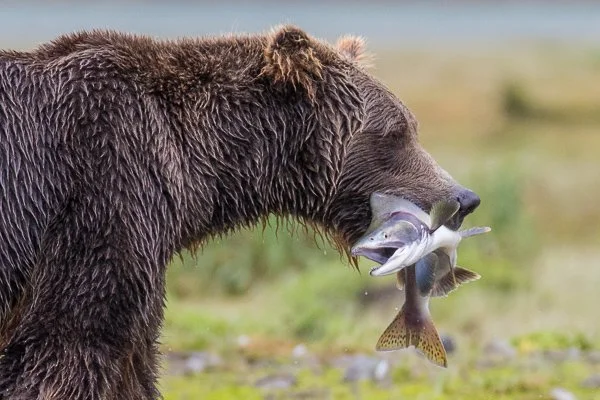OPR Announces Clean-up of Katmai Coast
This year we will kick off a partnership with the National Oceanographic & Atmospheric Administration (NOAA) to remove over 25 tons of ocean plastics from Katmai National Park. OPR Co-Founder Andy Schroeder has been visiting the park since moving to Kodiak Island 20 years ago, and in 2015 he assisted with the clean-up of Katmai led by the National Park Service. For Schroeder, who regularly takes visitors into the park, the inspiration to organize a large-scale clean-up in Katmai came after seeing several of Katmai’s world-famous brown bears gnawing on and possibly ingesting ocean plastics during the summer of 2018.
Brown bear gnawing on a large piece of polyethylene plastic, Geographic Harbor, Katmai National Park. Photo by Jan Simonin.
A Katmai brown bear with a proper meal. Photo by Chris Bray Photography.
Katmai National Park boasts 497 miles of coastline on the Pacific Ocean side of the Alaska Peninsula. Its chief attractions are the volcanic landscapes created by the eruption of Novarupta in 1912, and the coastal brown bears which roam unimpeded through the mostly roadless park and congregate around salmon streams each summer.
Collectively, the clean-ups planned for 2021-2022 will be the largest marine debris removal effort in Katmai to date. This project is made possible by a $205,000 matching grant from NOAA’s Marine Debris Program. Since 2006 NOAA has been the primary agency in the United States tasked with combating the marine debris issue, and has funded numerous projects throughout Alaska, including four in the Kodiak archipelago.
Over the life of the project, OPR plans to conduct a series of 4 to 6 vessel-based clean-up expeditions to Katmai. Our goal is to remove 25 tons of ocean plastic from the marine environment and improve approximately 500 acres of coastal habitat for the salmon, the bears, and all the wild inhabitants of this 4,000,000-acre park.
The numerous bays in which our work will take place are geographically isolated from the roads and infrastructure that connect park headquarters to the community of King Salmon. Apart from bush planes, the only way to access the Katmai coast is by boat, and the nearest major port is Kodiak. Our staff and team of volunteers will use the research vessel Island C as a base of operations during our clean-up expeditions and will access the shore and shuttle marine debris with a specially designed landing craft.
Schroeder sifts through a cache of marine debris in Kuliak Bay, Katmai NP. Summer 2019.
In addition to our significant clean-up and habitat restoration work, OPR Co-Founder Scott Farling will oversee our research effort to develop sustainable reuse, recycling, and recovery solutions for ocean plastics. This work is an essential element of our mission and is expected to contribute to improved environmental outcomes for clean-ups around the world. OPR will focus on characterization, sorting, and pre-processing, while our research partners at Western Washington University and Oregon State University focus on mechanical recycling and conversion technologies, respectively. A portion of the grant funds ($20,000) are designated to research, and as part of our commitment to match funds, OPR has pledged to leverage corporate and individual contributions triple that amount, generating an $80,000 investment to develop recycling and recovery solutions for ocean plastics.
Perhaps most importantly, over the next two years, our expeditions will take a select group of university and high school students on a once-in-a-lifetime adventure to one of the frontlines of the global ocean plastics crisis – the Alaska coastline. It will be an opportunity to see firsthand the impact that marine debris has on the environment and wildlife, the scale of the ocean plastics phenomenon, the risk associated with delaying clean-up action, and the need for prevention efforts. It will also provide a sense of purpose when our university students return to their research laboratories and we hope it will serve as inspiration for high school students to become the environmental leaders and stewards of the future.



